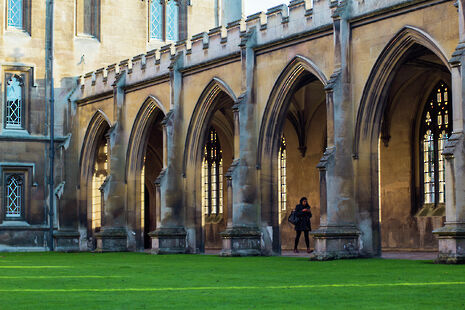St John’s aims to raise £100 million fund for bursaries
The college hope that the new fund will encourage students from lower income backgrounds to apply

St John’s College has announced a campaign which seeks to raise money for means-tested bursaries, in order to ensure that students from lower income backgrounds are not disadvantaged by the cost of a university education.
The campaign, for which the money raised will count towards the university’s wider initiative to raise £2 billion, is called the Free Thinking campaign, and aims to gather donations of £100 million from donors including Alumni. The funds raised “will be used to expand the College’s existing programme of means-tested support for home students, and to provide further assistance to overseas scholars, graduates and researchers”, according to the college website.
The Master of St John’s College, Professor Christopher Dobson, discussed his experience on being the first in his family to attend Oxbridge, and the second to attend university, stating: “I remember the astonishment that I felt when I realised not only that I had been accepted, but that my education was completely free”.
He went on to note that the move away from free tuition had affected school leavers’ decisions on university, saying: “Whatever the rights and wrongs of today’s funding model, the fact is that many highly talented young people from less well-off backgrounds either go to their local university to keep costs down, or abandon higher education altogether. I believe passionately, as does the College as a whole, that nobody should be denied – or indeed deny themselves – a place at Cambridge because of financial concerns.”
When contacted by Varsity, a spokesman for the College said that: “The College believes that every student who is capable of making the most of a place at St John’s should be able to benefit from a complete educational experience regardless of their ability to pay. At a time when the cost of higher education has risen significantly, we are committed to doing everything we can to enable students to benefit from a Cambridge education in full.”
When asked about whether there was a timescale for raising the funding, the spokesman replied that “there is no firm deadline attached to the campaign, but we hope to reach the target within five years.” They also said, on the subject of how many students the campaign aimed to help, that the goal was to “ensure that every student who comes to St John’s can do so without having to worry about finances” and that they wanted to extend their existing schemes so that they could offer “every student appropriate support on a case-by-case, and means-tested, basis”.
In addition, scholarships for international students are being planned, as are funds for postgraduate for all students. There is also hope for expansion of the Research Fellowships, to help academics focus on research, as well as Teaching fellowships for academics who are keen to teach alongside their research.
The initiative follows the announcement of the Studentships campaign earlier this year, which provides undergraduate Home and EU students from households with an annual income of less than £25,000 with money to cover living costs. Students who benefit from the Studentships will receive up to £9,250 as an annual grant.
The studentships campaign gained positive coverage in the media, including publication by The Telegraph as well as being tweeted by the Labour MP for Cambridge, Daniel Zeichner. Tom Levinson, Head of Widening Participation at Cambridge, also tweeted saying the scheme showed “Real demonstration of commitment towards low income students from @stjohnscam #wideningparticipation” [sic]
 News / Uni offers students £55k in payouts31 October 2025
News / Uni offers students £55k in payouts31 October 2025 News / Uni error forces deeper spending cuts31 October 2025
News / Uni error forces deeper spending cuts31 October 2025 News / Students allowed to use AI, says new uni guidance31 October 2025
News / Students allowed to use AI, says new uni guidance31 October 2025 News / Students launch women’s society excluding trans women31 October 2025
News / Students launch women’s society excluding trans women31 October 2025 News / College rowing captains narrowly vote to exclude trans women31 October 2025
News / College rowing captains narrowly vote to exclude trans women31 October 2025









